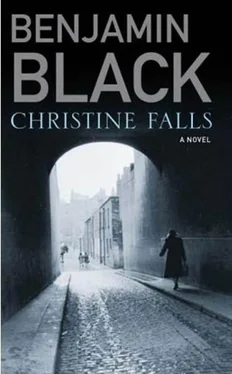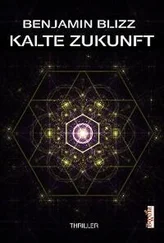In the silence they heard the rattle of raindrops blown against the window. She sighed, then rose and picked up her gloves, banishing that other, invisible, anguished sharer of her troubles. As if to herself she said, ruefully, “Well, I tried.” She smiled. “Thank you for the tea.” The two mugs stood untouched, a crinkled wafer of scum floating on the faintly quaking surface of the gray liquid. “I must go.”
“Ask me,” Quirke said.
He had not risen, but sat sideways at the table, poised and tense, one hand on the back of his chair and the other flat on the smeared tabletop. How could he be so cruel, playing with her always like this?
“You know I can’t,” she said.
“Why can’t you?”
She gave a laugh of mild exasperation. “Because I’d be in your debt!”
“No.”
“Yes!” she said, as vehement as he. “Do it, Quirke. Do it for Phoebe-for her happiness.”
“No,” he said again, flatly. “For you.”
IT WAS SATURDAY, IT WAS THE MIDDLE OF THE AFTERNOON, AND Quirke was wondering if he should find another pub to drink in. A dry October storm was sweeping through the streets and he had ducked into McGonagle’s with his coat collar up and a newspaper under his arm. The place was almost empty but he had no sooner settled himself in the snug than Davy appeared at the hatch and handed in a glass of whiskey. “Compliments of the gent in the blue suit,” he said, jerking a thumb behind him towards the bar and giving a skeptical sniff. Quirke put his head out at the door and saw him, perched on one haunch on a stool at the bar: suit of a shiny, metallic blue, horn-rimmed specs, black hair swept back from a lumpy forehead. He lifted his glass to Quirke in a wordless salute and smiled, baring his lower front teeth. He was vaguely familiar, but from where? Quirke drew in his head and sat with his hands on his knees and contemplated the whiskey as if expecting it to foam up suddenly and overflow with rancid whorls of smoke.
After a moment the blue suit appeared in the doorway. “Mr. Quirke,” he said, holding out a hand. “Costigan.” Quirke gingerly shook the proffered hand, which was square, blunt-fingered, and slightly damp. “We met at the Griffins’, the day of the party for the Chief Justice. The day the honor from the Pope was announced?” He pointed to the place beside Quirke. “May I?”
A coincidence, of a sort: Quirke had been thinking about Sarah, her face like Ophelia’s floating up pale but insistent out of the newspaper pages and their quag of reported grim goings-on-the Yanks testing a bigger and better bomb, the Reds rattling their rusty sabers, as usual. He was wondering still why she had come to him at the hospital and what it was exactly that she wanted of him. People seemed forever to be asking him for things, and always just the things he could not give them. He was not the man they took him for, Sarah, and Phoebe, even poor Dolly Moran; he had no help for them.
He often recalled the first unsupervised postmortem he had performed. He was working in those days with Thorndyke, the State Pathologist, who was already going gaga, and Quirke that day had been called on at short notice to stand in for the old boy. The cadaver was that of a large, silver-haired, antiquated gentleman who had died when the car in which he had been a passenger had skidded on a patch of ice and toppled into a ditch. His daughter had been bringing him back after a day out from the old folks’ home where he was living; she was elderly herself, the daughter, and had been driving cautiously because of the freezing conditions, but had lost all control of the machine when it began its sedate slide across the ice. She had escaped without injury, and the car was hardly damaged, but the old boy had died, instantly, as the newspapers liked to put it-who could say, he often asked himself, how long that instant might seem to the one who was doing the dying?-of simple heart failure, as Quirke was able quickly to establish. When the dissecting-room assistant had begun to undress the corpse with the usual, rough adroitness, there had slipped out of the fob of the waistcoat an old and beautiful pocket watch, an Elgin, with Roman numerals and a second hand in an inset dial. It had stopped at five twenty-three exactly, the moment, Quirke was certain, when the old man’s heartbeat too had stopped, heart and watch giving up the ghost together in sympathetic unison. So it had been with him, he believed, when Delia died: an instrument that he carried at his breast, one that had been keeping him aligned and synchronized with the rest of the world, had stopped suddenly and never started up again.
“A lovely day, that was,” Costigan was saying. “We were all so happy for the Judge, happy and proud. A papal knighthood, that’s a rare honor. I’m a knight myself”-he pointed to a pin in his lapel, in the form of a little gold staff twined about by a gold letter P -“but of a humbler order, of course.” He paused. “You never thought of joining us, Mr. Quirke? I mean the Knights of St. Patrick. You’ve been asked, I’m sure. Malachy Griffin is one of us.”
Quirke said nothing. He found himself fascinated, almost hypnotized, by the steady, omnivorous regard of Costigan’s magnified eyes, suspended like two deep-sea creatures in the fishbowl lenses of his spectacles.
“Lovely people, the Griffins,” Costigan went on, undeterred by Quirke’s wordless and resistant stare. “Of course, you were married into the family, weren’t you.”
He waited. Quirke said:
“My wife was Sarah’s-Mrs. Griffin’s-sister.”
Costigan nodded, assuming now an expression of unctuous solemnity. “And she died,” he said. “In childbirth, wasn’t it? Very sad, a thing like that. It must have been hard for you.”
Quirke hesitated again. Those undersea eyes seemed to be following his very thoughts. “It was a long time ago,” he said, maintaining a neutral tone.
Costigan was nodding again.
“Still and all, a hard loss,” he said. “I suppose the only way to cope with a thing like that would be to try to forget it, to put it out of your mind altogether. Not easy, of course. A young woman dead, a child lost. But life must go on, mustn’t it, Mr. Quirke?” There was the sense of some large, dark thing stirring soundlessly between them in the little space where they sat. Costigan pointed to the whiskey glass. “You haven’t touched your drink.” He glanced down at another lapel pin, declaring him a member of the Pioneer Total Abstinence Association. “I’m strictly t.t., myself.”
Quirke leaned back on the bench seat. Davy the barman hovered by the serving hatch, polishing a glass and eavesdropping.
“What exactly is it you’re saying to me,” Quirke asked, “Mr… what was the name again?”
Costigan ignored the second question, smiling tolerantly, as at a childish ruse. “I’m saying, Mr. Quirke,” he said softly, “that some things are best forgotten about, best left alone.”
Quirke felt his forehead go hot. He folded the newspaper and clamped it under his arm and stood up. Costigan watched him with what seemed a lively interest and even a touch of amusement. “Thanks for the drink,” Quirke said. The whiskey sat untasted in the glass. Costigan nodded again, briskly this time, as if something had been said that demanded his assent. He was still seated, but Quirke, towering over him, felt that somehow it was he who was on the inferior level.
“Good luck, Mr. Quirke,” Costigan said, smiling. “I’ll see you around, I’m sure.”
IN GRAFTON STREET GUSTS OF WIND WERE SWOOPING MORE STRONGLY than ever and the Saturday evening shoppers were hurrying homeward with their heads down. Quirke was aware of his quickened breathing and a thick, hot sensation in his chest that was not fear, exactly, but a kind of dawning alarm, as if the smooth, empty little island on which he had been happily perched had given a preliminary heave, and would presently reveal itself to be not dry land at all but the humped back of a whale.
Читать дальше












